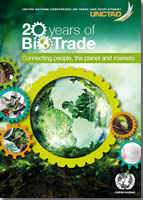BioTrade is good for businesses because it supports them to transform their models and supply chains to become more resilient to risks, adopt biodiversity-friendly practices while enabling them to function in line with industry and market requirements. This is done by businesses adopting the BioTrade Principles and Criteria (P&C).
The BioTrade P&C can provide guidance for businesses looking to respect biodiversity in a way that helps their business thrive and assures customers that their businesses, products, and services respect nature and people.
Some of the business benefits of adopting the P&C:
-
Meet consumer demand for goods and services that are biodiversity-friendly. Consumers are increasingly aware of the environmental crisis and the need to consume products that respect our planet and people.
-
Offer companies the opportunity to sell products such as cosmetics, textiles, phytopharmaceuticals, handicrafts, and services (e.g. ecotourism) that have been produced following a set of sustainable economic and social principles, respecting both biodiversity and the people who depend on it.
-
Increase visibility into supply chains all the way from consumers to the farmer/collector level, for example by implementing traceability and documentation systems.
-
Enhance resource availability by implementing adaptative management practices that advance long-term availability of the resources used to prevent or mitigate negative environmental impacts; for example, by developing management plans or resource assessments.
-
Comply with local and international regulations including benefit-sharing agreements.
-
Build business resilience by implementing measures that strengthen the companies´ operations to mitigate supply chain risk during crises or adapt to climate-related hazards and natural disasters.
6,000 consumers surveyed by the Union for Ethical BioTrade (UEBT) in 2020 feel that "companies have a moral obligation to ensure that they have a positive impact on people and biodiversity".
Successful BioTrade businesses
There are several examples of businesses that have benefited from following the BioTrade P&C while helping to conserve and sustainably use biodiversity and generate livelihoods.
Salay Shae Saung, a small business making immune-boosting natural jujube and tamarind syrup in Myanmar built business resilience to COVID-19 shocks.
The company kept its doors open, kept workers employed and safe, and boasted a turnover of around 80% compared to the previous year, thanks to measures it adopted before the pandemic as part of adopting the BioTrade P&C.
These measures such as new traceability and documentation requirements for its factories and farmers allowed them to quickly implement the specific hygiene and safety measures required by the local government.
The Eudafano Women’s Cooperative in Namibia make natural oils from marula seeds and other indigenous plants for the cosmetics industry following the BioTrade P&C has created valuable economic opportunities for 2,500 Namibian women and their communities.
Applying the P&C enables the cooperative - a leading producer of marula oil in the southern African region and run by a board made up exclusively of women from the community - to promote sustainability; to preserve the community’s traditional environmental knowledge; to support equal sharing of benefits; and to respect the rights of all actors especially the local community.
Want to learn more about BioTrade?
Put biodiversity at the centre of your business strategies, operations and supply chains and help ensure that your company will be here for future generations.



